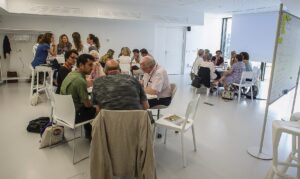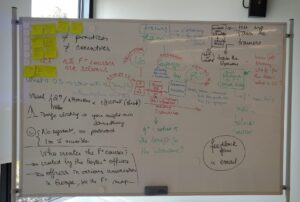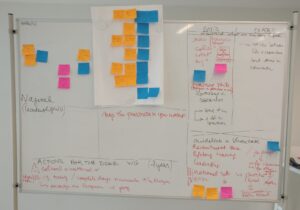Let’s Build The Skills! LIBER & FOSTER Plus Workshop at LIBER 2018
Open science is gaining momentum, and research librarians are starting to invent new digital models, to implement new techniques and to spread a more open culture.
In this light, what digital skills do librarians still need to develop? How can we do this, and which materials can help us to train, advocate and practice open science? These were some of the questions discussed at a recent workshop at LIBER’s 2018 Annual Conference in Lille, France. A workshop report is available below. Documents and presentations can be found on Zenodo.

The workshop was jointly organised by LIBER’s Digital Skills for Library Staff & Researchers Working Group and the FOSTER Plus project.
Digital Skills Training and Open Science in Europe – An Overview from Workshop Attendees
Workshop participants suggested that the Digital Skills Working Group do the following:
- Take into account cultural and national differences with skills, LIS schools, lifelong training and digital / OA / OS policies
- Encourage a European LIS programme; provide ideas and examples to encourage a complete change in LIS programmes in Europe
- For recruitment, lifelong learning and leadership: list the skills related to job profiles (for librarians / for other professions)
- Collect and share guidelines for digital skills related to job profiles
- Suggest some method for getting started with an institutional digital transformation
They also highlighted various initiatives and projects, including the FOSTER Plus project, the European Open Science Cloud and LIBER’s Job Description Marketplace.
Part I – FOSTER Plus Training, Multimodule Kit & the OpenScience Training Handbook
Helene Brinken, FOSTER Plus Officer at Göttingen University, presented FOSTER+ OpenScience material (all workshop material can be found on Zenodo). On the FOSTER Plus portal, the following is available.
The Open Science training handbook and the Digital Skills Working Group pages on the LIBER website are also interesting resources.
Advocating Before Training Requires Team Building and Scenario Drafting
The key question is: Who is going to advocate in libraries?
- Librarian = you are the promotor of Open Science advocacy and training in your institution
- Senior researcher = your “superstar”. Find an (already convinced) senior researcher who acts like an ambassador for Open Science
- Young researcher and/or PhD student = your chance for the future since he/she will advocate with other young researchers and/or PhD students

Measure Your Knowledge and Train the Trainers
- Test first, train then
- Train the trainers
- Form a group of trainers from various professions; many viewpoints from different perspectives helps you to be more convincing
FOSTER Plus Interest: Beyond Various Practices, Different Countries
- General advocating and training
- You have to adapt the modules to your uniqueness
Part II – Digital Skills: Challenges, Major Requirements & Expectations for Library Staff & Researchers
Open Science Skills are not the Only Digital Skills Area to Tackle
This was also visible during the Knowledge Café Part II on July 5th with people giving direct feedback (tag cloud). Examples were sent by email before the workshop by and to its attendees.
Soft Skills and Knowledge can be More Important During the First Steps Than Effective Technical Skills
Make sure there is a method and make sure people understand (1) the “why” and (2) “what” before you train them to (3) “how”. Librarians, young researchers, senior researchers should first discover what are the benefits of digital skills / Open Science / coding / whatever, than understand “what it is/how it works”, and “doing” comes last.
A Point of View on Basic vs Expert Skills
Basic skills can be split and/or shared between professions: “This is a librarian skill; this is a young researcher skill; this is a senior researcher skill”.

Expert skills do not belong to a profession. They have to be provided by the institution, the Ministry, the EU — no matter if the expert is an individual or a group, a librarian, a researcher, an economist or a lawyer. It should be easy for librarians, researchers and institutional Open Science policy officers to identify and contact the expert (expert on licensing, on Commons intellectual property, on e-economy, on metadata curation, etc).
New skills?
Get new blood on board: new colleagues, other professions, innovative profiles that bring new skills
Train the trainers and adopt new and collaborative training methods to engage people into action.
Related news articles